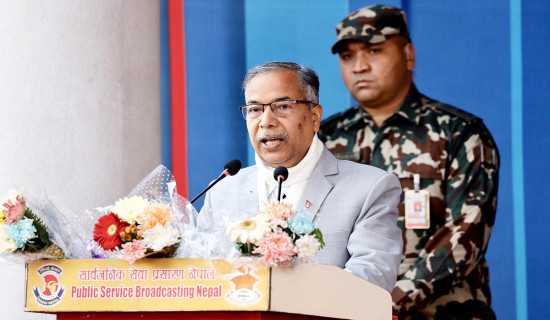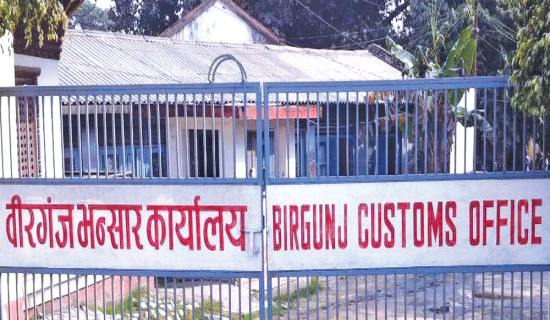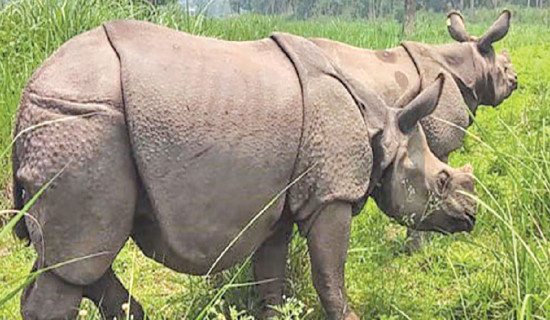- Saturday, 31 January 2026
Milk collection centres turn into dairy firms
By Laxman Kafle,Hetauda, June 28: At a time when one cooperative after another is becoming problematic, some cooperative organsiations related to milk collection have been developed as an industry.
A total of 13 milk and dairy products processing and diversification and marketing sub-projects run by dairy producers' cooperatives in Bagmati and Madhes provinces have been completed and started milk processing.
Thanks to the Nepal Livestock Sector Innovation Project (NLSIP) under the Ministry of Agriculture and Livestock Development which has helped them develop as milk processing industry.
Manakamana Dairy Producers' Cooperative (Manakamana Dugdha Utapadak Sahakari Sanstha) of Makawanpurgadhi Rural Municipality-3, Makranchuli of Makwanpur and Shree Devnagar Dairy Producers' Cooperative of Bharatpur Metropolitan City-6, Chitwan upgraded into milk processing industries from milk collection centres after getting support from the NLSIP.
Other cooperatives, such as Bethanchowk Dairy Producers' Cooperative of Kavrepalanchowk, Gaurigunj Dairy Producers' Cooperative, Pithuwa Dairy Producers' Cooperative and Gauridhara Dairy Producer's Cooperative of Chitwan, Kalika Agriculture Cooperative and Janachetana Abhiyan Agriculture Cooperative of Dhanusha, Sai Agriculture Cooperative and Ramnagar Small Farmer Agriculture Cooperative of Saptari, Small Farmer Agriculture Cooperative and Bala Sundari Small Farmer Agriculture Cooperative of Siraha and Namuna Women Multipurpose Cooperative of Kathmandu have started producing dairy products.
The NLSIP is a project conducted by the Ministry of Agriculture and Livestock Development with the support of concessional loans from the World Bank with the aim of increasing productivity in selected livestock value chains, increasing the value of livestock products and strengthening the animal service sector of Nepal.
This project has been implemented since the fiscal year 2017/18.
The NLSIP is conducting sub-projects in 289 municipalities in 28 districts of five provinces of the country.
This project is conducting a subsidiary project by cooperating with the farmers in a cooperative/group and individual manner with the aim of making the country self-sufficient in the production of milk, goat meat and pashmina.
With the support of the project, these cooperatives which started milk collection from farmers almost three-four decades ago, are now starting to manufacture dairy products such as curd, ghee, butter, cheese and chhurpi.
In this project, there is a provision that the project should invest 50 per cent, banks and financial institutions should invest 30 per cent while 20 per cent should be self-invested by the sub-projects.
Farmers highly benefited
Arjun Prasad Dahal, Chairman of Manakamana Dairy Producers' Cooperative, said that the cooperative started collecting milk from farmers in 2042 B.S. and has now developed into an industry.
"Now that the cooperative has started to produce and market dairy products from the milk collection itself, the members of the cooperative and the farmers who sell milk in this cooperative are happy," he said.
According to him, even they had planned to work in product diversification in the past, but it could not metarilise in the absence of investment and idea.
"But now our dream has come true after receiving financial and technical support from the NLSIP project," he said.
The cooperative received a grant of around Rs. 10 million from the project. However, the total investment of the project reached Rs. 23.4 million, according to the cooperative.
Around 14-15 people who received training from the NLSIP here are manufacturing dairy products as employees, he said.
According to him, they are producing curd, ghee, butter, cheese and chhurpi, among others.
"We are collecting around 5,000 litres of milk daily. Out of it, they produced dairy products from 2,500 litres of milk. The remaining milk is being sold to the district cooperative union," he said.
The capacity of the industry to produce dairy products is 6,000 litres.
The cooperative is supplying products in the market using its own quality mark received from the concerned government agencies.
Scheme for farmers
With the view to encourage farmers and increase milk production, the cooperative has introduced various farmers-targeted schemes.
According to the cooperative, it has established a farmer welfare fund where the cooperative deposits Rs. 1 per litre itself and Rs. 1 from the farmers' side in the Fund.
Besides, the cooperative has been providing Dashain expenditure at the rate of Rs. 1.5 per litre every year. Under this system, the cooperative provides an amount based on the annual sale of milk of individual farmers.
Similarly, the cooperative said that the farmers who sell at least 30 litres of milk per day are being provided Rs. 2 per litre for transportation.
The cooperative has set a target to make a transaction of Rs. 250 million this year while it was Rs. 210 million last year.
He said that it has a plan to produce sweets and sell from its counter.
Hope to end milk holiday
Similarly, Shree Devnagar Dairy Producers' Cooperative which started the collection of milk in 2052 B.S. has also started the production and distribution of packet milk, curd, ghee and butter itself for the last couple of months.
Janardan Paudel, manager of the cooperative, said that the income of cooperative and members has increased after starting to sell milk, curd, cheese and ghee in its own brand rather than selling the raw milk.
According to him, they are preparing to manufacture ice-cream as well.
"We are able to work in product diversification of milk products with the technical and financial support of NLSIP," he said. The cooperative invested above 20 million for the infrastructure and equipment. It received a grant of Rs. 7.4 million from NLSIP.
The cooperative which has 205 members is collecting around 1,500 litres of milk daily and selling after processing. The amount of milk collected was only 150 litres in 2052 B.S.
He said that it has a target to collect at least 3,000 litres of milk.
"Due to the outbreak of COVID-19 and the milk holiday, we are expecting an end to the situation where milk is not sold and thrown away," he said.
According to him, the members are more excited about milk production after getting good income from the sale of milk. "We are able to provide an additional amount to farmers as the income of the cooperative is increased by selling other products instead of only raw milk. The cooperative is collecting milk at Rs. 71.60 per litre," he said.
Dr. Bidur Gautam, chief of Nepal Livestock Sector Innovation Project, Decentralised Level Support Unit, Hetauda, said that progress has been achieved according to the project's goals.
He said that the farmers have benefited from the sub-projects as sub-projects run under individual farmers, cooperatives and farmers’ groups are operating as per the target.
The aim of the project is to promote commercial livestock and make the country self-reliant in milk and meat products.
Around 69 sub-projects were completed and came into operation under the Decentralised Level Support Unit, Hetauda. Other 39 sub-projects are in the implementation stage.
He said that milk collection along with income of farmers and cooperatives has increased with the operation of sub-projects.

















